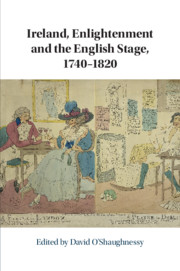Book contents
- Ireland, Enlightenment and the English Stage, 1740–1820
- Ireland, Enlightenment and the English Stage, 1740–1820
- Copyright page
- Contents
- Illustrations
- Tables
- Contributors
- Acknowledgements
- Introduction Staging an Irish Enlightenment
- Part I Representations and Resistance
- Part II Symbiotic Stages: Dublin and London
- Chapter 4 Midas, Kane O’Hara and the Italians: An Interplay of Comedy between London and Dublin
- Chapter 5 Trading Loyalties: Sheridan, The School for Scandal and the Irish Propositions
- Chapter 6 Sydney Owenson, Alicia Sheridan Le Fanu and the Domestic Stage of Post-Union Politics
- Part III Enlightened Perspectives
- Select Bibliography
- Index
Chapter 6 - Sydney Owenson, Alicia Sheridan Le Fanu and the Domestic Stage of Post-Union Politics
from Part II - Symbiotic Stages: Dublin and London
Published online by Cambridge University Press: 22 July 2019
- Ireland, Enlightenment and the English Stage, 1740–1820
- Ireland, Enlightenment and the English Stage, 1740–1820
- Copyright page
- Contents
- Illustrations
- Tables
- Contributors
- Acknowledgements
- Introduction Staging an Irish Enlightenment
- Part I Representations and Resistance
- Part II Symbiotic Stages: Dublin and London
- Chapter 4 Midas, Kane O’Hara and the Italians: An Interplay of Comedy between London and Dublin
- Chapter 5 Trading Loyalties: Sheridan, The School for Scandal and the Irish Propositions
- Chapter 6 Sydney Owenson, Alicia Sheridan Le Fanu and the Domestic Stage of Post-Union Politics
- Part III Enlightened Perspectives
- Select Bibliography
- Index
Summary
This chapter explores performances of Irish femininity in London and Dublin following the Act of Union, sketching a literary relationship between writers Sydney Owenson and Alicia Sheridan Le Fanu and between the two cities. Although Sydney Owenson is usually thought of as a novelist, Taylor shows how her play The First Attempt (Dublin 1807) and the author’s own public performances drew on tropes employed by earlier male playwrights in order to (re)stage Anglo-Irish relations in feminine terms. At a special performance of The First Attempt, and in later social gatherings in London, Owenson, dressed in her “wild Irish girl’s” red silk mantle, strategically feminizes and civilizes an earlier Irish character type, such as John Henry Johnstone’s Teague from The Faithful Irishman. Similarly, Alicia Sheridan Le Fanu’s comedy The Sons of Erin (1812) restages and feminizes her brother’s earlier play, Richard Brinsley Sheridan’s St. Patrick’s Day (1775), asserting that Enlightened, politicized Irish women hold the power to influence the Union beyond the stage doors.
The chapter argues that Owenson and Le Fanu’s feminized rewritings of male Irish playwrights chime with London’s desire for feminized pacifications of Irish characters following 1798. At the same time, Owenson and Le Fanu also offer a subversive message about women’s place in Anglo-Irish politics and Ireland’s place in the Union. Both women used the domestic English setting to stage Irish grievances right at the heart of the empire.
- Type
- Chapter
- Information
- Ireland, Enlightenment and the English Stage, 1740-1820 , pp. 146 - 164Publisher: Cambridge University PressPrint publication year: 2019

